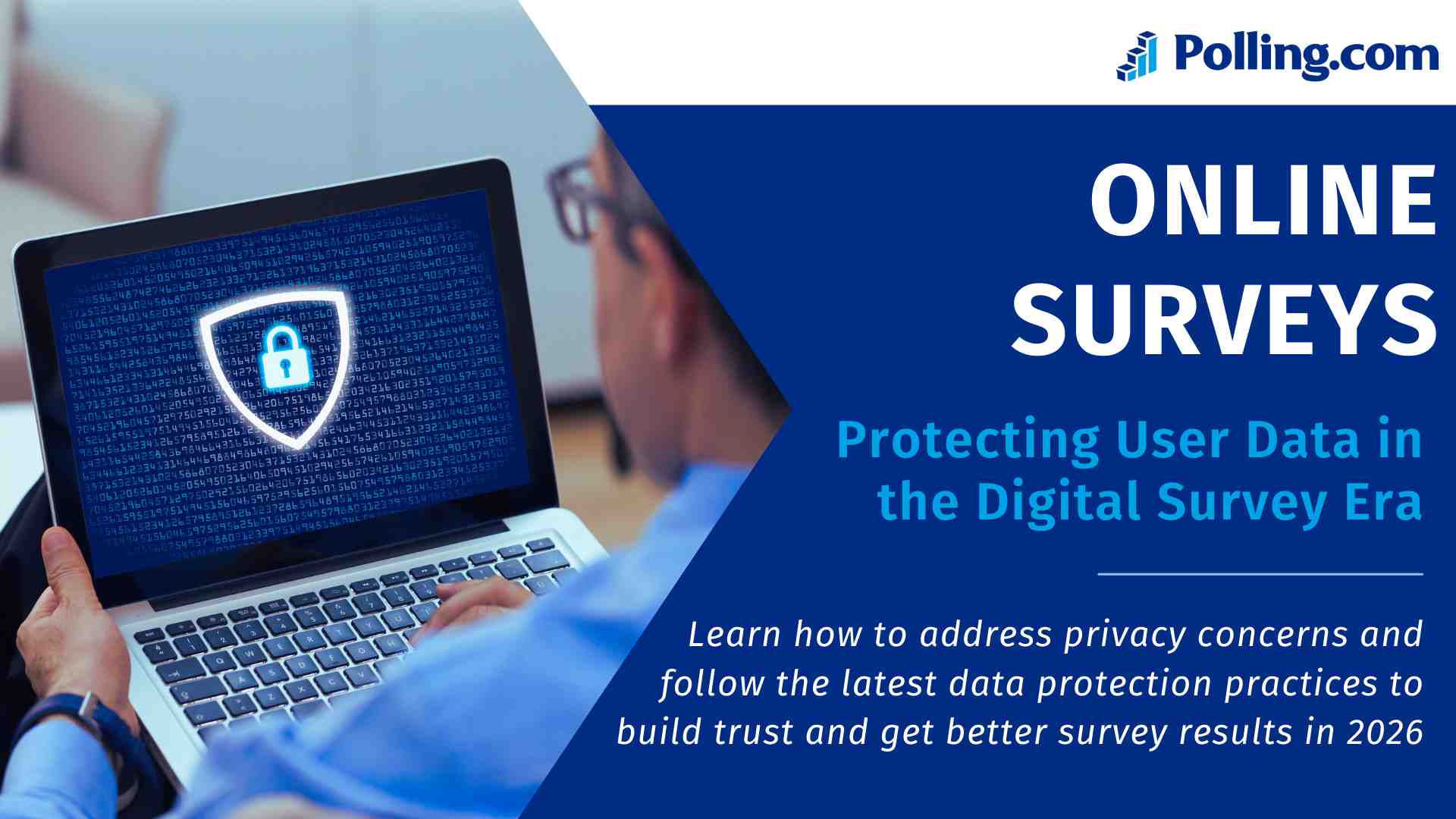
Online Surveys 2026: Privacy Concerns and Data Protection Tips
This article has been fully updated for 2026 to reflect evolving privacy concerns, updated legal standards, and cutting-edge data protection trends in online surveys. As survey technology and regulations change, protecting respondent data continues to be one of the most critical aspects of survey design and execution.
Online surveys are a powerful tool for gathering feedback, research data, and insights across industries. However, as digital risks evolve and privacy expectations grow, understanding how to safeguard respondent data while complying with current laws is essential for survey creators and researchers alike.
What’s New in 2026
1. Stricter Privacy Regulations & Compliance Trends
In 2026, privacy laws continue to tighten worldwide:
- Expanded data protection enforcement in U.S. states beyond California’s CCPA.
- More stringent COPPA revisions affecting how children’s data is handled online.
- Increased focus on data minimization, transparency, and user rights as global laws evolve.
2. Privacy by Design Is Becoming Standard Practice
Organizations must now integrate privacy into every step of survey development and deployment, following privacy-by-design frameworks not just for legal compliance but as a best practice. This includes limiting the collection of identifiable information, active consent workflows, and encryption by default.
Understanding Online Surveys
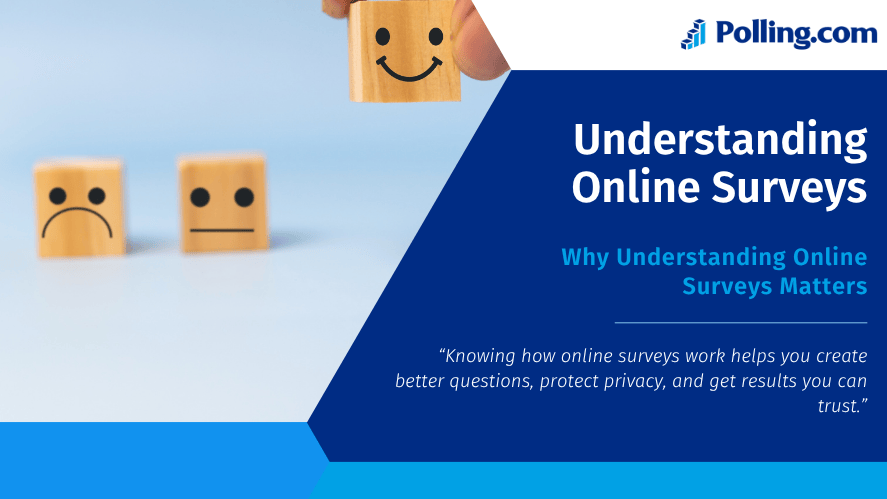
Online surveys collect a wide range of data, from demographic information to behavioral responses, and organizations use them extensively for market research, academic studies, and customer feedback.
The challenge is balancing the insights you need with the least amount of personal data to reduce privacy risk.
In addition to their broad utility, they offer several advantages: wide reach, low cost, fast data collection, and easy analysis.
Types of Online Surveys
- Customer Satisfaction Surveys: These collect feedback from customers, focusing on their experiences with a product or service.
- Market Research Surveys: These gather insights into market trends, consumer behavior, and competitor positioning. This information is essential for strategic business planning.
- Employee Engagement Surveys: These evaluate how engaged and satisfied employees feel in their roles. In turn, they help organizations improve workplace culture and management practices.
- Academic Surveys: Researchers use these to collect structured data for studies. Ultimately, they contribute to advancements across various academic fields.
Privacy Concerns in Online Surveys
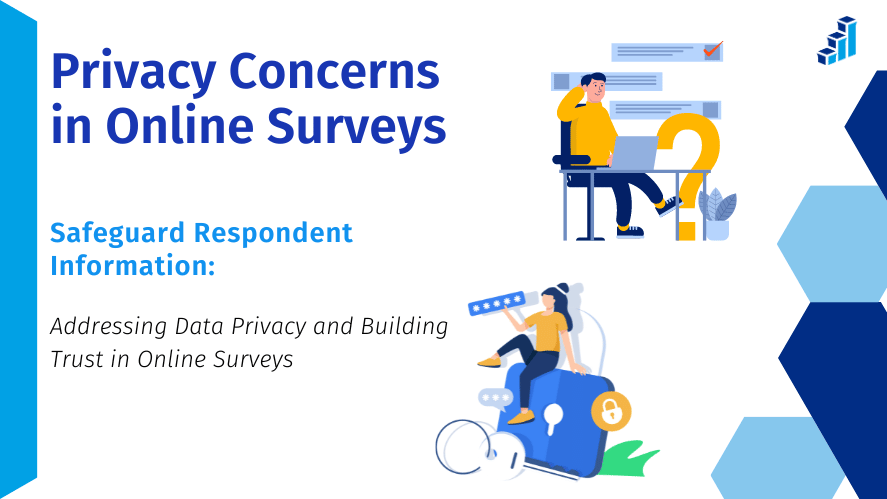
Data Collection Practices
Online surveys may gather demographic, behavioral, or psychographic data, but collecting unnecessary personal information increases privacy risk and decreases trust. Always assess whether a data point is essential before including it.
Evolving Data Breach Risks
Survey platforms are still vulnerable to cyber threats such as hacking, phishing, and unauthorized access especially as AI-driven cyberattacks become more sophisticated. Advanced encryption and secure architecture are now baseline requirements.
Anonymity vs. Confidentiality
Maintaining anonymity prevents anyone from tracing responses back to individual participants. Maintaining confidentiality ensures that collected data remains private and is only used for the stated purposes. Survey designers need to clearly state which protections are in place.
De-Identification Techniques
Using de-identification helps ensure that even if data is accessed, it cannot be linked back to specific respondents. This involves removing or obfuscating identifiers before analysis.
Legal and Ethical Considerations
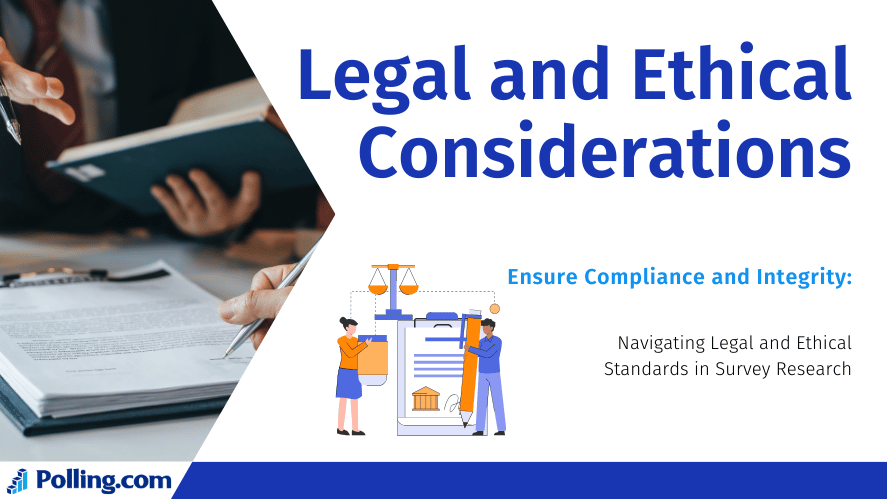
Global Privacy Laws
- GDPR still sets the bar for data protection in EU surveys and influences global standards.
- CCPA / CPRA in California expands user rights, including data access and deletion.
- New state and international laws emphasize clearer consent language and data subject rights.
Ethical Best Practices
Ethical survey design means being transparent about:
- What data you collect
- Why it’s needed
- How it’s protected
Ethical transparency builds respondent trust and increases honest participation.
In addition, transparency means clearly communicating data handling practices, while respect for privacy involves limiting data collection and safeguarding information.
Strategies to Address Privacy Concerns
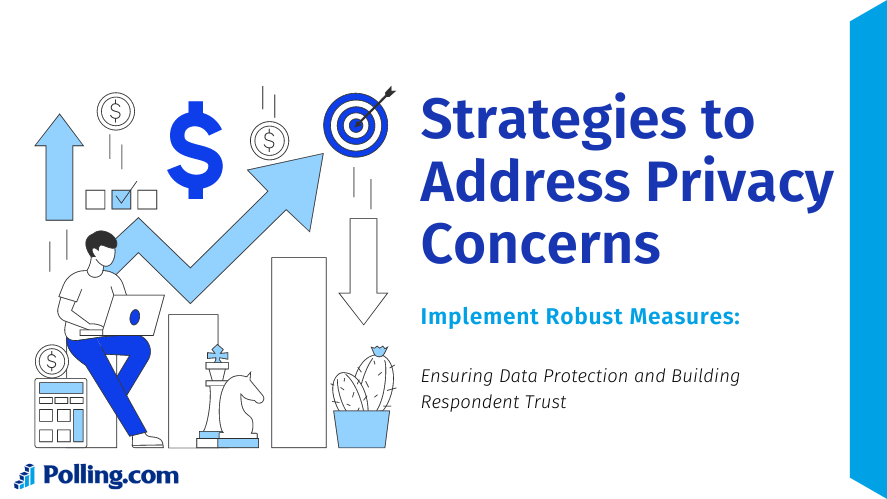
Data Encryption and Security Measures
Data encryption is essential for protecting survey responses. It converts sensitive data into coded formats that require a key to decode. In combination with secure servers and regular software updates, encryption helps keep data safe from unauthorized access. Implementing two-factor authentication further strengthens protection.
Privacy-Friendly Survey Design
- Only ask for necessary data.
- Use randomized identifiers instead of personal information.
- Include clear consent and opt-out options upfront.
Regular Audits & Updates
Privacy practices should evolve with technology and regulation. Regular security and compliance audits help maintain trust and reduce risk.
Minimizing Data Collection
The principle of data minimization involves collecting only the data that is necessary for the survey’s purpose. This reduces the risk of data breaches and respects respondents’ privacy.
Survey creators should carefully design questions to avoid unnecessary data collection.
Clear Privacy Policies
Clear privacy policies show how data is used, stored, and protected. They also cover data collection, security, sharing, and user rights. This clarity builds trust.
Obtaining Informed Consent
Gaining informed consent requires more than just a checkbox. It involves clearly explaining the survey’s purpose, data type, usage, and storage methods. Respondents should also be informed about anonymity, how long the survey will take, and who to contact with questions.
This clarity empowers users to make informed choices before participating.
Best Practices for Survey Creators
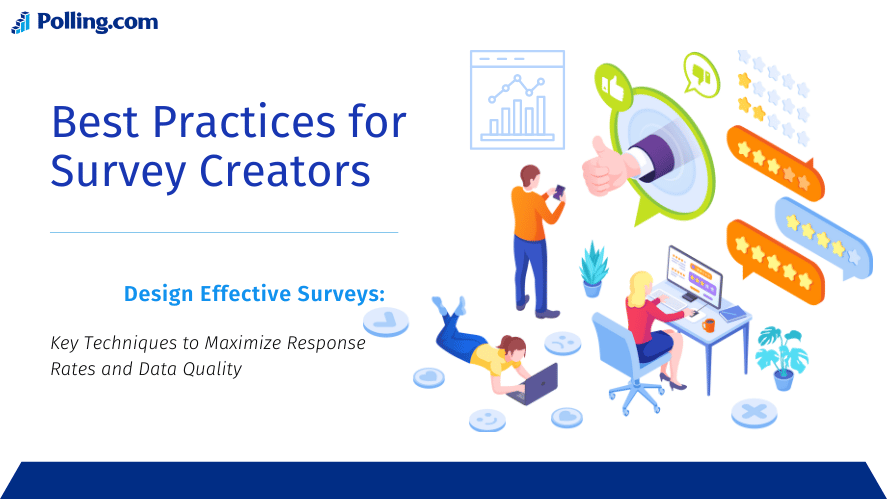
Designing Privacy-Friendly Surveys
To design surveys that respect privacy, survey creators should:
- Avoid collecting personal information unless absolutely necessary.
- Use randomized identifiers instead of personal information.
- Clearly state how anonymity and confidentiality will be maintained.
- Allow respondents to skip questions they are uncomfortable answering.
Regular Audits and Updates
Privacy practices should evolve with technology and law. That’s why regular audits are essential they help ensure that your survey tools and policies remain effective.
During audits, review security settings, user permissions, and data storage methods. Staying updated with privacy regulations also shows users that you take compliance seriously.
A Practical Guide to Securing Survey Data
When running online surveys, protecting user data isn’t just a legal requirement it’s a key to building trust. To ensure your surveys are safe and compliant, follow these practical steps. Each one contributes to a more secure and privacy-friendly experience for your participants.
Step-by-Step Privacy Checklist
| Privacy Feature | Why It Matters | What to Look For |
|---|---|---|
| GDPR/CCPA Compliance | Ensures the tool follows strict data protection standards | Mention of compliance on website |
| Anonymity Settings | Protects respondent identity | Option to disable IP/email tracking |
| Data Encryption | Keeps survey responses safe during storage and transfer | SSL/TLS encryption |
| Consent Collection | Respects user rights and legal requirements | Opt-in checkboxes or informed consent popups |
| Transparent Privacy Policy | Helps users understand how data is collected and used | Easy-to-read and accessible documentation |
Secure Storage and Access
Once data is collected, it’s just as important to store it safely.
- Store collected data using encrypted databases or secure cloud services with strict access controls.
- Limit who can view raw survey data internally only authorized staff should have access.
- Implement automatic deletion policies to safely discard outdated records after a defined period.
🔐 Tip: Encrypt backups too. Losing a USB drive with unprotected survey responses could lead to major legal issues.
Transparency Builds Participation
Surprisingly, being open about your data protection steps can actually boost response rates. When users see that you care about their privacy, they’re more likely to complete your survey.
Here’s a simple statement you can include:
“Your responses are anonymous, securely stored, and will never be shared without your consent.”
This kind of transparency adds confidence while helping you stay aligned with global data protection standards.
Why Privacy Should Be a Priority in Online Survey Design
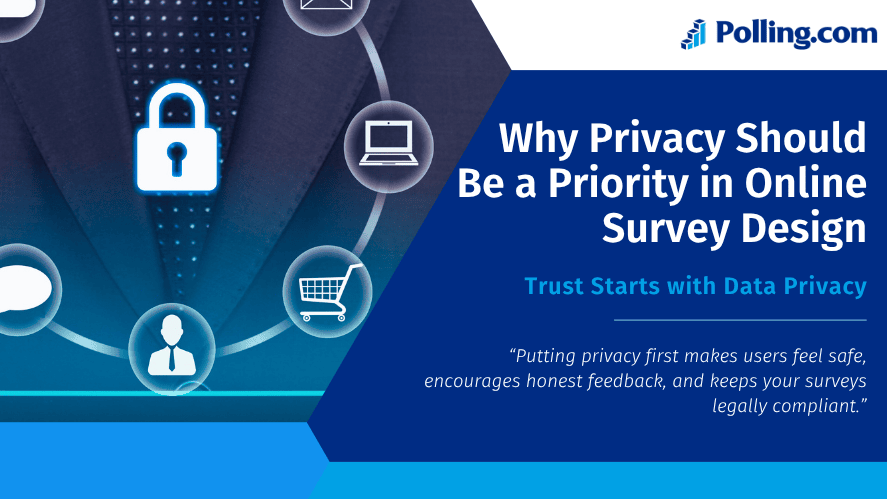
With more people sharing personal information online, protecting survey data has become a non-negotiable priority. Whether you’re a marketer, researcher, or educator, it’s critical to make privacy a key part of your survey strategy. Ignoring privacy risks not only damages trust it could also put you at odds with major data protection laws.
How Poor Survey Privacy Hurts Response Rates
When users aren’t sure how their information will be handled, they hesitate to answer honestly or at all. Even well-designed online surveys can fail if participants feel their privacy is at risk. In today’s privacy-first world, transparency and protection aren’t optional they’re essential.
That’s why understanding survey data protection is more than a tech concern. It’s a communication strategy. If you want meaningful feedback, people need to know their answers are safe.
Common Privacy Risks in Online Surveys
Not all threats are obvious. While most survey platforms promise security, it’s still important to understand the most common privacy pitfalls. Here are just a few:
| Risk Type | Description | Example |
|---|---|---|
| Data Overcollection | Asking unnecessary personal info | Requesting names, locations, or income |
| IP Tracking | Recording user IPs without clear consent | Surveys that track users automatically |
| Weak Encryption | Failing to secure stored or transmitted data | Plain-text data transfers |
| Lack of Consent | No opt-in for data usage | Auto-start surveys with no explanation |
| Poor Access Control | Survey data is accessible to too many people inside your organization | Unrestricted admin-level access |
Avoiding these issues not only keeps you legally safe it helps you gain long-term trust from your audience.
GDPR and User Consent in Online Surveys
The General Data Protection Regulation (GDPR) sets clear standards for handling user data in the EU and it affects global survey creators, too. If even one respondent is based in Europe, GDPR rules may apply. This means you must:
- Ask for explicit consent before collecting data
- Explain how the data will be used
- Allow users to opt out or request data deletion
Other regions have their own privacy laws, such as CCPA in California or PIPEDA in Canada. Together, they all emphasize one core message: user control matters.
By including GDPR-friendly features in your survey like checkboxes for consent and links to privacy policies you can stay compliant and build credibility.
Choosing the Right Survey Tools for Privacy Protection
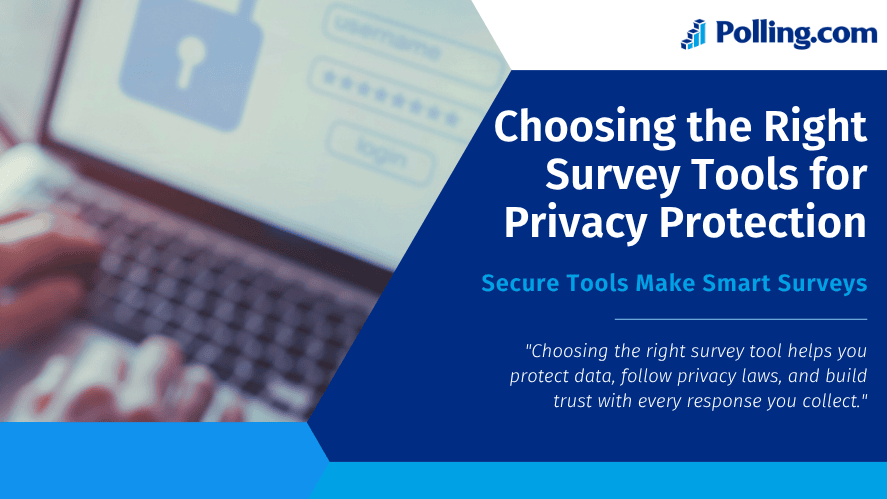
Using secure tools is one of the easiest ways to improve your online survey privacy practices. But not all platforms are created equal. Look for tools that:
- Support anonymous surveys with no IP/email tracking
- Use end-to-end encryption for both data in transit and at rest
- Provide easy privacy policy integration and consent settings
- Offer role-based access, so only certain staff can view raw results
- Allow data to be deleted or exported at any time
These features make your online questionnaires safer and more professional especially when dealing with sensitive topics.
Final Thoughts: Privacy Is a Competitive Advantage
While privacy compliance may seem like a burden, it can actually become one of your biggest assets. Users are more likely to respond and respond truthfully when they feel respected and protected. By following privacy-first practices, you don’t just avoid penalties. You create better relationships, higher engagement, and more reliable survey data.
For businesses, researchers, and educators alike, survey data protection isn’t just about avoiding risk. It’s about earning trust in a world where data misuse makes daily headlines.
Frequently Asked Questions
Common concerns include collecting unnecessary personal data, tracking IP addresses without consent, storing data without encryption, and lacking clear privacy policies. These issues can lead to mistrust or even legal consequences.
To follow GDPR, you should obtain explicit user consent, explain how data will be used, limit the amount of personal data collected, provide opt-out options, and include a link to your privacy policy.
Look for platforms that offer data encryption, anonymous response settings, opt-in consent tools, role-based access control, and the ability to delete or export user data at any time.
Conclusion
Survey privacy continues to evolve as laws, threats, and user expectations change. By designing surveys with privacy by design principles, adhering to global regulations, and communicating transparently with respondents, survey creators can protect data and boost engagement. Protecting privacy in 2026 isn’t optional it’s a competitive advantage.
🔐 Looking for a privacy-first survey tool?
Explore our recommended platform at Polling.com to keep your data secure and your audience engaged.
👉 Visit Polling.com
